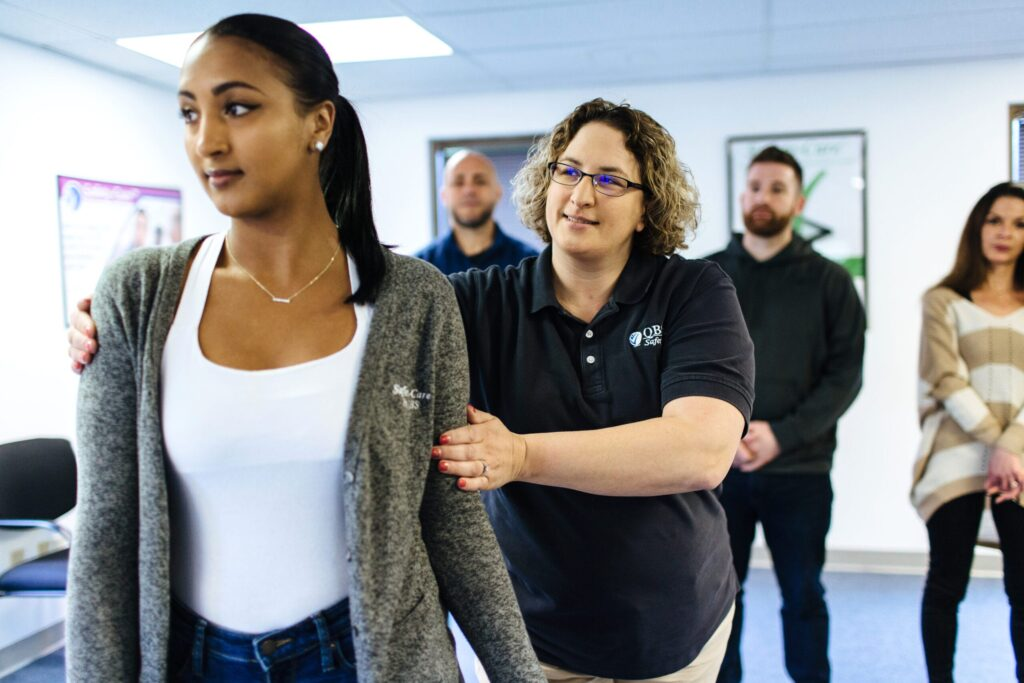Pennsylvania House Bill 301 – Education Grants for De-escalation Training
House Bill 301 established a grant program to provide grants to PA school districts for the purpose of school safety and security. Specifically, these grants are meant to support programs focused on mental health, conflict and dispute resolution, violence prevention, and should have some form of evidence-based, trauma-informed de-escalation training.

.png?width=88&height=95&name=Group%20137%20(5).png)


How to Implement Safety-Care?
1. Register for a Safety-Care Trainer class or call us to request a closed session for your organization. We regularly conduct classes in all 50 states and Canada.
2. Complete your class to become a certified Safety-Care Trainer for your organization. We bring you to fluency using an errorless teaching methodology.
3. You train and certify your staff in Safety-Care’s effective techniques.
4. Our Master Trainers are available by phone, email, or video to help your organization with any questions or concerns while using or implementing Safety-Care.

Legal Requirements
|
Summary and Safety-Care Alignment: Passed: 12/13/2023 Last Updated: December, 2024 House Bill 301 established a grant program to provide grants to PA school districts for the purpose of school safety and security. Specifically, these grants are meant to support programs focused on mental health, conflict and dispute resolution, violence prevention, and should have some form of evidence-based, trauma-informed de-escalation training. How Safety-Care aligns: Numerous school districts throughout the United States and Canada rely upon QBS and our Safety-Care training to provide their staff members with the training they need to help maintain a safe and healthy learning environment. Safety-Care provides a comprehensive, supportive approach to incident prevention, de-escalation, and management. District staff will learn practical strategies for helping students that use evidence-based practices consistent with PBIS (Positive Behavior Interventions and Supports) and ABA (Applied Behavior Analysis). Safety-Care can help your district meet grant requirements in the following ways: |
|
(2) Conflict resolution or dispute management; How Safety-Care aligns: Safety-Care trains individuals in the use of our Help, Prompt, and Wait strategies as early de-escalation techniques that can prevent crisis situations from escalating to physical altercations. These proven methods can be used by trained individuals to prevent conflict or disputes from impacting student learning. |
|
(3) School-wide positive behavior support; How Safety-Care aligns: Safety-Care is fully designed around the use of Positive Behavior Intervention and Supports (PBIS). Individuals trained in Safety-Care will be fully equipped to encourage and promote positive behavior in students. |
|
(6) Risk assessment, safety-related, violence prevention curricula; How Safety-Care aligns: Safety-Care initially focuses on incident minimalization, in an effort to support positive behaviors and reduce risks. Physical safety training is focused on staff’s situational awareness and physical protection within their work environments. It includes safety techniques aimed at preventing common staff injuries and includes relevant role-plays. Finally, physical management techniques are taught. These techniques focus on a least-to-most restrictive process, emphasizing natural positioning, minimal intrusiveness, and the safety of all involved parties. |
|
(10) Development and implementation of research-based violence prevention programs that address risk factors to reduce incidents of problem behaviors among students; How Safety-Care aligns: QBS ensures that all Safety-Care trainings are developed using evidence-based practices and emphasizes the used of Applied Behavior Analysis (ABA) in our curriculum. Additionally, Safety-Care curriculum is updated as new studies and research becomes available, ensuring that your staff is trained in the most current and appropriate responses to student behavior. |
|
(17) Staff training programs in the use of positive behavior supports, de-escalation techniques, and appropriate responses to student behavior that may require immediate intervention. How Safety-Care aligns: Safety-Care is focused on encouraging positive behavior prior to the use of any other intervention strategy. Our approach stems from the use of Positive Behavior Intervention and Supports (PBIS) that can prevent and manage challenge behavior. Safety-Care certified individuals are trained to use our Help, Prompt, and Wait strategies as early intervention procedures that effectively de-escalate potential crisis situations before any physical management is necessary. |
|
(21) Trauma-informed approaches to education, including: (ii)(A) Programs providing trauma-informed approaches to education the curriculum, including training of school employees, school directors and behavioral health professionals to develop safe, stable and nurturing learning environments that prevent and mitigate the effects of trauma. How Safety-Care aligns: Safety-Care is uniquely designed to provide trainees with the skills to assess potential crises, how de-escalate these situations, and how to respond if the situation is elevated. Our trainings are trauma-informed and focus on modifying behavior to prevent dangerous outcomes. Additionally, our Master Trainers are all certified Behavioral Analysts, and come prepared to educate your staff on the most current practices in trauma-informed care. |
|
(27) Training and related materials for school employees or students that are evidence based and focus on identifying the signs and signals of anxiety, depression, suicide or self-harm in students. How Safety-Care aligns: Safety-Care teaches techniques for incident prevention, including teaching staff how to structure a supportive and safe environment, using appropriate and everyday safety habits, and effectively providing behavioral reinforcement. Our program also stresses the importance of contributing factors of challenging behavior such as psychiatric or neurological conditions and traumatic events as well as the prevention strategies needed to ensure safe behavior. |
Why Safety-Care?
Benefits & Differentiators
In addition to Safety-Care being highly cost-effective, you get:

Skills to effectively prevent, minimize, & manage behavioral challenges with dignity, safety, & the possibility of change

Decreases in staff and patient injuries and reduction in restraint & seclusion time

Instructional procedures based on decades of evidence-based research & compatible with ABA, PBIS & reinforcement-based environments

Customizable program for your setting, staff & clientele, with a strong focus on preventative via non-intrusive, replacement behaviors

Extremely rigorous standards grounded in errorless teaching methodology

Small, intimate class sizes backed by unlimited support & resources
How Is Safety-Care So Effective?
A Genuine Focus on Implementing & Managing Positive Behavioral Skills
Proactive, environmental management recommendations
Understanding of evocative effects of staff behavior
In-depth analysis of antecedents and proactive antecedent interventions
Evidence-based reinforcement procedures
Required competency in de-escalation skills
Humane, non-invasive touch and QBS Check™ strategies
Evidence-based teaching procedures
Applicable to a wide array of settings, conditions & challenging behavior





